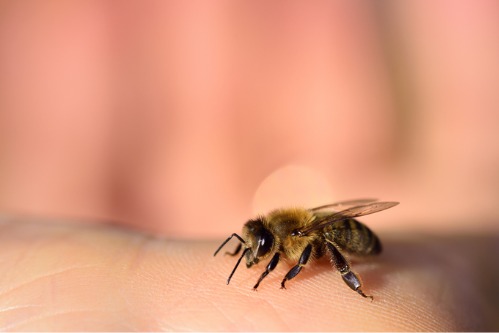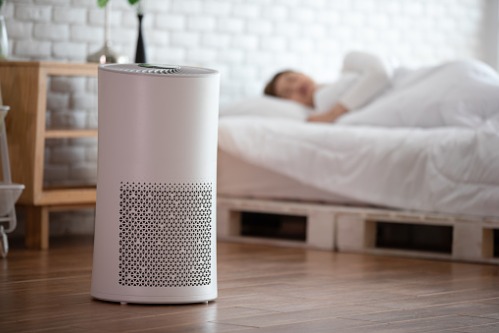
When to See a Doctor for a Bee Sting Reaction
A bee sting can be a painful experience, but for most people, a sting will only cause minor symptoms. However, approximately two million people are allergic to insect stings, and these individuals are at risk for a life-threatening reaction. So what should you do if you get stung by a bee, and when should you see a doctor?
Symptoms of a Bee Sting Reaction
Bee stings often present a range of symptoms, some more serious than others. It isn’t uncommon for someone to have a different reaction each time they are stung. So, just because you didn’t have a severe reaction to a bee sting in the past doesn’t mean you won’t have one in the future. For this reason, it is important to be aware of the symptoms of a bee sting reaction.
Mild Reactions
Mild bee sting reactions usually involve localized pain and swelling and subside relatively quickly. For example, you may notice that the area around the sting swells and becomes red. A bee sting typically feels like a sharp burning pain that worsens over time. In most cases, these symptoms can be treated at home with over-the-counter pain medication and ice packs.
Moderate Reactions
It is possible to have a more moderate reaction to a bee sting, even if you have never had one before. A moderate allergic reaction may cause symptoms such as hives and extreme redness. Swelling at the site of the sting may also gradually increase for a day or two. If you notice a moderate reaction each time you are stung, you should speak with an allergist. This is especially true if the reaction worsens each time you are stung.
Severe Reactions
A severe reaction, also known as anaphylaxis, is a potentially life-threatening emergency. This type of reaction requires immediate attention. While only a small percentage of people have a severe reaction to bee stings, it is crucial to be aware of the symptoms. Anaphylaxis may cause symptoms such as:
- Difficulty breathing
- Nausea and vomiting
- Diarrhea
- Dizziness, fainting, and loss of consciousness
- Swelling of the face, throat, and tongue
- Pale or flushed skin
- Hives
- A rapid heartbeat
If you are experiencing these symptoms, call 911 or go to the nearest emergency room immediately. If you experience a severe reaction to a bee sting, you are also more likely to have a severe reaction in the future. Therefore, you should consult with an allergist to discuss your options for bee sting treatment and prevention.
Multiple Bee Stings
Ordinarily, insects such as bees and wasps will only sting humans if they feel threatened. However, if an insect’s nest is disturbed, the insects may attack in large numbers. Moreover, some types of bees are more likely to swarm than others. If you are stung by multiple bees, the venom from the stings can build up in your system and cause a severe reaction. This may cause symptoms such as:
- Vertigo
- Nausea and vomiting
- Diarrhea
- Convulsions
- Fever
- Headaches
Children and the elderly are more likely to experience a severe reaction from multiple bee stings. People with underlying heart or respiratory conditions are also at a higher risk for complications. If you are stung by multiple bees, it is essential to seek medical attention even if you don’t have a known allergy.
What Causes a Bee Sting Reaction?
A bee sting allergy is caused by an immune system reaction to bee venom. The cells in your body respond to foreign substances, such as bee venom, by producing the antibody immunoglobulin E (IgE). IgE triggers the release of histamine and inflammatory chemicals, which causes the allergy symptoms.
Treatment Options for a Bee Sting Reaction
Most bee sting symptoms may be treated at home with over-the-counter medications. For example, you may take ibuprofen to reduce pain and swelling. You can also apply a cold compress or ice pack to the site of the sting for 15-20 minutes at a time.
On the other hand, if you are experiencing an anaphylactic reaction, you may need to be treated with an allergy shot of epinephrine. Epinephrine is a medication that can help to reduce bee sting allergy symptoms. You may also need to be treated with antihistamines and cortisone through an IV. Your doctor will likely prescribe an epinephrine auto-injector to carry with you at all times. It is vital to ensure you and those closest to you know how to use the auto-injector in an emergency. Speak to your allergist or doctor if you have any questions about how to use it.
Furthermore, allergy shots (immunotherapy) may be recommended as a long-term treatment option. This treatment involves receiving a series of injections over the course of several years. Immunotherapy aims to reduce the severity of a bee sting reaction and eventually make them less dangerous. This is done by gradually exposing your body to bee venom through injections. As a result, your body becomes less sensitive to bee stings over time.
Manage Your Bee Sting Allergy with Northeast Allergy
If you are concerned about bee sting reactions, Northeast Allergy, Asthma and Immunology offers allergy testing and several treatment options. Seeking treatment is the best way to manage your bee sting allergy and may potentially save your life. To learn more about bee sting allergy testing and treatment, schedule an appointment with Northeast Allergy today.



